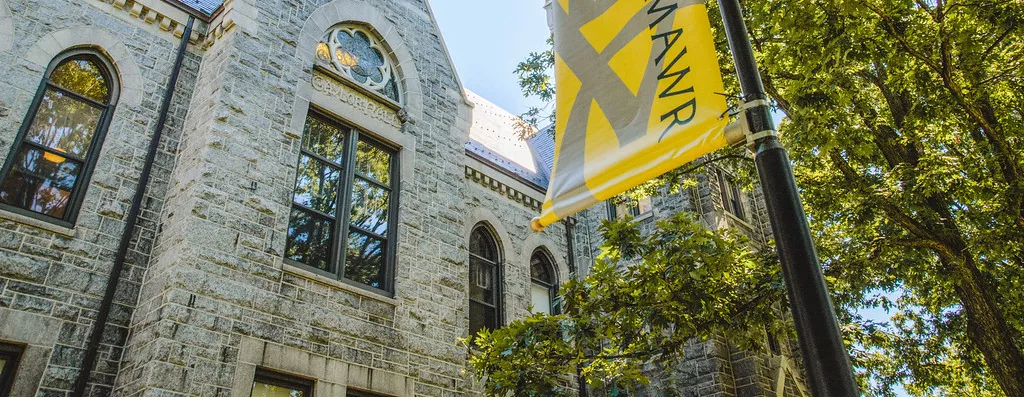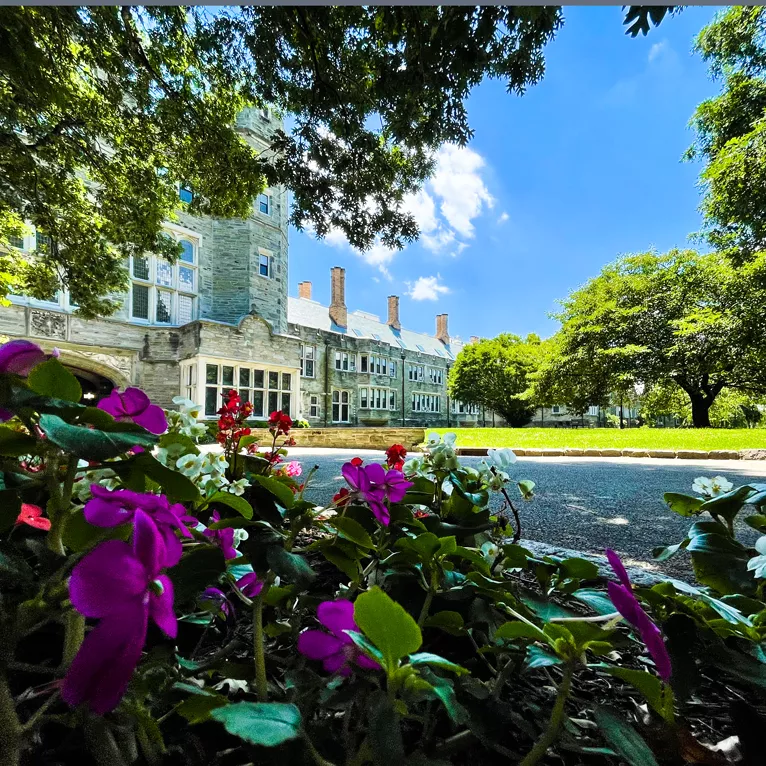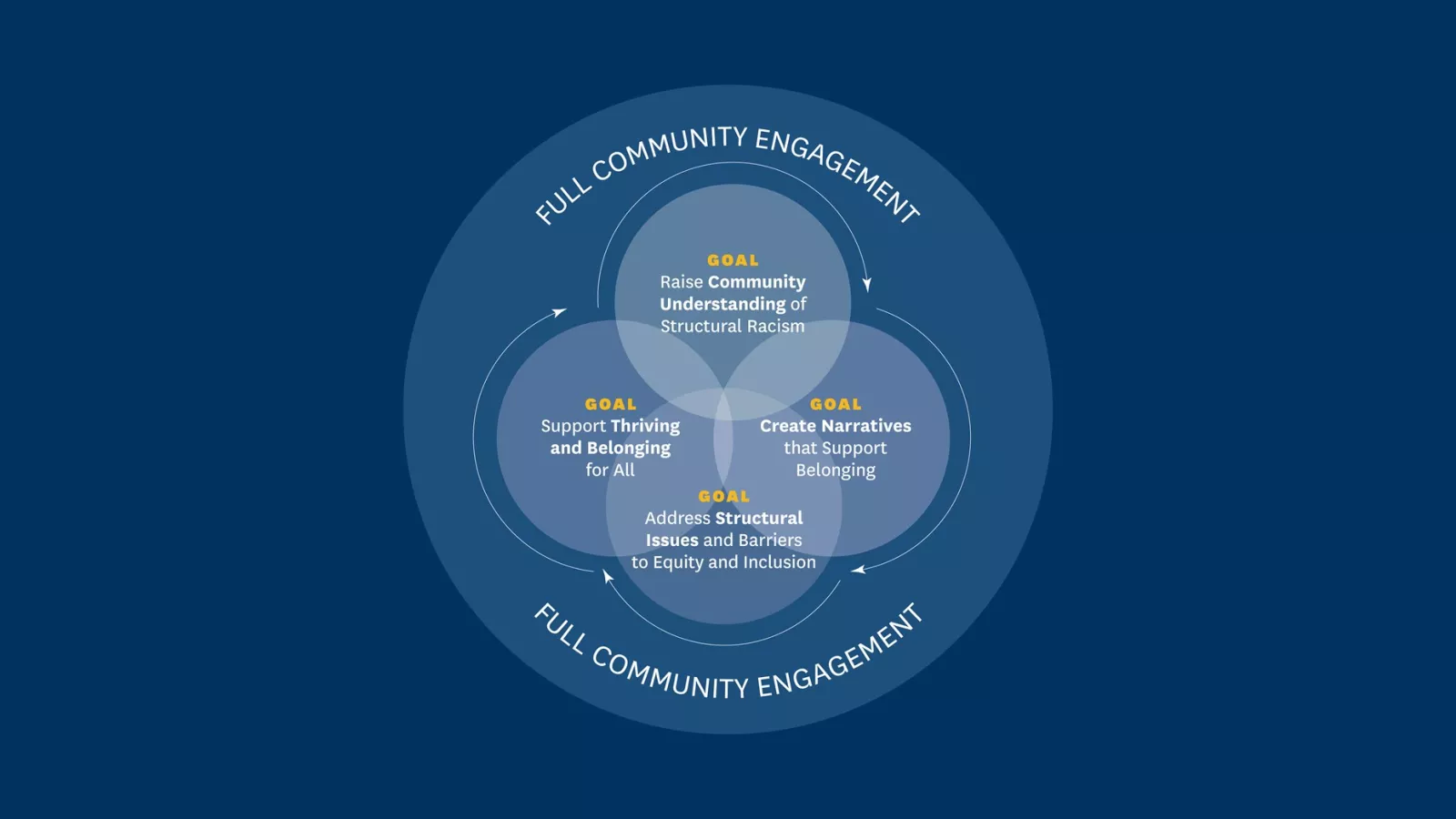
Summer 2023 Communication
"Equity and inclusion serve as the engine for excellence and innovation. A commitment to racial justice and to equity across all aspects of diversity propels our students, faculty, and staff to reflect upon and work to build fair, open, and welcoming institutional structures, values, and culture." — From the College’s mission statement
This vision of change at Bryn Mawr College outlined in this document draws on principles and values in the College’s mission statement and that resonate with the campus today. This is a living document that is evolving as the needs of the campus change and as we learn from our experience.
The College sharpened its focus on diversity, equity, inclusion, and anti-racism in 2015, taking steps to advance this work over time. The student-led strike in Fall 2020, in particular, inspired action and accelerated change. New, additional investments build on these previously existing efforts in synergistic ways. To maintain a forward focus, the College has developed a proactive, work-in-progress approach to frame higher-level goals and aspirations and actions to support these goals. Through this ongoing work, we aspire to be a campus where all community members have a sense of belonging and where all community members experience the Bryn Mawr community as a place where they can grow and thrive.
Bryn Mawr’s vision for change centers on four main goals to advance diversity, equity, inclusion, and anti-racism (DEIA).
Chief among these overlapping and synergistic goals is to support community members in developing a more complete and nuanced understanding of the processes by which power, privilege, and oppression are perpetuated at the College. This understanding will help us address structural barriers to equity and inclusion effectively and empower campus members to thrive and contribute their gifts and strengths to build strong narratives of belonging at Bryn Mawr.
Investing in the College’s work together as a learning community that supports the respectful and rigorous exploration of diverse viewpoints is critical to this approach. These actions are offered with openness and humility and with an awareness that they will evolve and benefit from the input and implementation of students, faculty, staff, and administrators as we do this important work together.
The College began publishing annual DEIA plans and year-end reports of work by students, faculty, staff, and administrators in 2015. Since many of the actions listed below are framed as continuing, please see the summer 2023 progress report for more details.
Academic Year 2023-24 Action Steps
GOAL: The Bryn Mawr College community will have a deep and nuanced understanding of structural racism and the processes by which power, privilege, and oppression in many dimensions are sustained.
Offering Learning Opportunities
- The President’s Office will continue to support teach-ins on equity, inclusion, and anti-racism topics through compensating presenters and providing organizational support.
- The President’s Office will offer larger-scale community opportunities for learning such as the Advancing Inclusive Excellence speakers series.
- The College will organize facilitated discussions for students, faculty, and staff on current issues concerning race, racism, and anti-racism.
- Administrative division leaders will continue to provide professional development programming on equity, inclusion, and antiracism issues. Division leaders will create a repository of educational and training resources so that these can be circulated with other divisions with the goal of coordinating and deploying educational and training resources more strategically.
- Undergraduate first-year programs will teach social tools to promote positive social interaction and reduce harm caused by ignorance or bias.
- The new Student Programs Coordinator will work with colleagues across the College to support first-year undergraduate students in understanding the Honor Code and community values and expectations. The Dean’s Office will partner with the Honor Board to review practices and protocols and make adjustments to increase equity.
- GSSWSR will host monthly facilitated discussions on structural inequality open to the whole campus community.
- GSSWSR’s Center for Student Success will offer workshops and training focused on how the dynamics of power, privilege, and oppression shape lived experiences, and provide pedagogical support for faculty teaching the required GSSWSR course on this topic.
- GSSWSR’s CONNECT program for first-year students will amplify curricular content about addressing microaggressions.
- GSAS will offer Black History Month programming for graduate students to complement College-wide programming.
- Across learning opportunities, we will take steps to create learning goals and to assess learning directly. The Office of Institutional Assessment, Planning, and Assessment can provide support for this work.
Course and Curricular Design and Implementation
- The new curricular requirement on “Power, Inequity, and Justice” will launch in AY ’24. In the fall semester, 17 departments will offer 23 courses that fulfill the requirement, with additional courses to be offered in the spring. The Provost’s Office will continue to offer course development funds to faculty developing courses to fulfill this requirement.
- The Provost’s Office will offer financial support and work with fellow provosts to support the new TriCo Asian American Studies Program.
- The College will pilot instruction of first-year Korean in AY24 with support from the Flexner Lectureship.
- The Provost’s Office, in collaboration with faculty, the Career and Civic Engagement Center, and the Registrar, will continue the Inside-Out Prison Exchange Program pilot and explore ways to expand the College's involvement with this teaching program at State Correctional Institution Chester and possibly with other correctional facilities.
- The Provost’s Office will work with faculty, including the new faculty appointment to Africana Studies, to support program planning in Africana Studies.
Measurable Outcomes: Campus-wide participation in programming; positive impact and learning of programs as measured by impact surveys of programs; improvement in perceptions of campus climate. Utilize direct assessment to measure learning.
GOAL: Address structural issues and barriers to equity and inclusion for students, faculty, and staff.
Increasing Access and Strengthening Financial Aid
- The Enrollment Division will review and model expansion of the replacement of loans with grant aid for more students on need-based financial aid to help address cost as a barrier to enrollment.
- The College will complete a Memorandum of Understanding with the Community College of Philadelphia (CCP) in August 2023. A variety of CCP and BMC departments have created pathway programs for CCP students to transfer to Bryn Mawr and complete their degrees.
Addressing Institutional Policies and Practices
- The Dean of the Undergraduate College Division will conduct a policy audit in which each department examines its policies and practices, identifies areas that could negatively impact student success and belonging, and propose appropriate revisions.
- GSSWSR has retained an outside consultant to assist in implementing an equity lens to review its practices and policies. Among other changes, it continues to modify course schedules to remove barriers to enrollment.
- The Vice President and Chief Information Officer and Constance A. Jones Director of Libraries and Collections Staff will continue the current Native American Graves Protection and Repatriation Act (NAGPRA) repatriation process, and the Departmental Collections Working Group will ensure that our Collections’ policies for acquisition and use of collections are ethical across the College and consistent with best practices.
- The Title IX policies website and manual will be revised so that they are simpler to follow, provide timetables, and outline procedural steps. The Title IX Officer will provide regular training to Student Affairs, Athletics, Campus Safety, and other staff who may hear concerns related to possible policy violations.
Building Understanding
- The Dean of the Undergraduate College will explore the creation of a Social Justice Fellow in Residence program that would bring a social justice advocate to campus to collaborate with administrators, faculty, staff, and students to advance the College’s mission to build fair, open, and welcoming institutional structures, values, and culture. By sharing professional expertise and supporting learning and exploration, the Fellow would facilitate the progress of equity and anti-racism initiatives at the College.
- The Title IX Officer, in collaboration with staff in the Undergraduate Dean’s Office, will revise education and training provided to students and student leaders about Title IX and sexual misconduct. They will also offer a workshop on Title IX for new GSAS students and for teaching assistants.
- The President’s Office will continue to support the efforts of the Workplace Advisors in assisting staff and faculty to find resources to address workplace issues.
Removing Physical Barriers
- The College will continue to improve the physical accessibility of the campus and campus spaces with a focus this year on the implementation of a wayfinding/signage project, renovation of Rhoads patio, an accessible walking loop around Merion Green made possible through the Shillingford Field renovation (that will also include an accessible viewing area), an accessible entrance to the Cloisters, and widening office doorways as part of the ongoing Park Science renovation.
Creating Opportunities
- The Investment Office will collaborate with the Center for Career and Civic Engagement to create a Finance Careers Trek to make these careers more accessible to students of diverse backgrounds.
- The GSSWSR Center for Student Success will do the following:
- Support free licensure preparation for all interested MSS students.
- Financially support three Social Sector Leadership Summer Fellows to offset financial barriers to summer internships.
- GSSWSR will add additional writing support hours and additional computer lab hours, including on weekends and evenings, for students who are unable to access these resources during the day. In addition, LITS will offer library office hours at GSSWSR.
Measurable Outcomes: More transparent processes and procedures. Students, faculty, and staff perceive structures to be more equitable. Representation in structures and processes reflects the diversity of our community. Conduct an assessment of equity in observable measures.
GOAL: Create a campus environment where all students, faculty, and staff have a sense of thriving and belonging
Deepening DEIA Awareness and Practice
- The Provost’s Office will continue to assess practices and policies to ensure that faculty equity and inclusion work is valued and supported. The office will continue to offer financial support for DEIA faculty initiatives, including course releases to faculty members who engage in specific DEIA work at the College.
- GSAS will continue to organize DEIA workshops for new graduate students and inclusive pedagogy workshops for TAs, open to all graduate students.
- The College Communications Office will celebrate individual and group contributions to the College’s DEIA goals.
Building Community
- The Campus Safety Office now reports to the Dean of the Undergraduate College; it will continue its mission to provide for the safety of all community members.
- The President’s Office will facilitate and support student, staff, and faculty initiatives to reclaim Old Library as a community space for the campus community today.
Supporting Students
- The Dean of the Undergraduate College, the Director of Access Services, LITS, and the Provost will collaborate to ensure that programs and the curriculum are inclusive and accessible through increased staffing in Access Services (Director position is now full-time, a new full-time Assistant Director position has been added, and a GSSWSR intern supports the work of the office); purchase of the YuJa Enterprise platform to assist faculty in ensuring course materials are accessible; offering workshops to graduate students and faculty; and continued work toward College-wide adoption of universal design principles. The College is also investigating a tool to streamline the process of making web materials accessible.
- Planning for the summer 2023 STEMLA program emphasized finding a balance between organic community building and strategically planned cohort bonding and streamlining extracurricular offerings to align with new cohort interests.
- The Dean’s Office will continue to partner with faculty to develop a strengths-based approach to advising.
- The Undergraduate Dean’s division will pilot the Intercultural Living and Learning Center (ILLC) at Rhoads South, creating a dedicated space to explore and celebrate BIPOC Belonging, Pan-Asian Cultural Heritages, and Interfaith Engagement.
- The Enrollment and Undergraduate Dean’s divisions will collaborate to create a dedicated support model for transfer students. Resources will include newly renovated dedicated space for transfer students located in Radnor (“The Burrow”).
- The new Campus Safety Liaison in the Dean’s Office will work with officers to facilitate positive relationships with students. The Liaison will provide training and mediation necessary to resolve student conflicts, conduct wellness checks, and respond to calls from students who are experiencing duress to connect them with College resources.
Supporting Faculty and Staff
- The Provost’s Office will strengthen the junior faculty mentoring program, to support advancement and retention of faculty; the Provost has applied for an external grant to help support this effort.
- The Provost’s Office, in conjunction with other offices, will continue its efforts to strengthen faculty retention, using information from recent exit interviews.
- The TriCo institutions will assess the shared training program for supervisors offered in spring 2023 that included best practices to promote thriving for all employees and determine future approaches.
Measurable Outcomes: Reported sense of belonging increases and gaps in a sense of belonging based on identity become smaller; higher retention rates and graduation rates for all students; higher retention rates for faculty and staff; course evaluations reflect inclusive classrooms; more diverse staff and faculty at all levels.
GOAL: Create narratives that support belonging
Expanding Community
- The Admissions Office will expand outreach and recruiting activities to reach diverse populations of students through additional visits to community-based organizations, developing new affordability messaging and programming, and exploring the possibility of creating college preparatory programming.
- The Undergraduate Dean’s division will prioritize recruitment and retention of a diverse staff, at all levels of the Division’s staffing structures.
- GSSWSR will work with its alumni and affinity groups to build connections and network with current student groups.
- The College Communications Office will promote awareness and understanding of identity celebration opportunities via official College communications channels.
- Alumnae/i Relations and Development will continue to build a more inclusive Alumnae Association, specifically through initiatives such as Tapestry and the Black Alumnae/i Fund.
Remembering and Reclaiming
- The ARCH Project will continue in the development of Nekisha Durrett’s artwork Don’t Forget to Remember (Me). In AY 24, student interns will work with the artist to recommend a list of those to be memorialized; Facilities staff will complete work to make the Cloisters and artwork accessible; and community members will have opportunities to interact with the artist and the artisans with whom she works.
- Members of the faculty, staff, alumnae/i, and students will engage in conversations about monuments, memory, and public art in classes and elsewhere to build an intellectual, historical, and social context for the College’s work with Monument Lab.
- The President’s Office, faculty, and staff from LITS will continue to support the work of recovering stories about the College’s history and helping to create more inclusive narratives of Bryn Mawr’s identity and trajectory through the Who Built Bryn Mawr? project and other learning opportunities offered through the curriculum, and through LITS internships for undergraduate and GSAS students. Starting in AY’25, this work will be additionally supported through a new Postdoc position funded by a generous gift to the College.
- GSAS will enhance its communications about DEIA work in GSAS and GSAS contributions to College history projects.
Building Skills for Connection
- The President’s Office will continue support for the Dialogue Project in collaboration with faculty and staff convenors to build the capacity of students, faculty, and staff to engage in difficult conversations, and will explore options to expand the Project’s reach.
- Information will be gathered from the Undergraduate Dean’s division that explores these questions: What is currently working to support feelings of belonging as DOUC Division staff? What other kinds of things do they imagine could happen to support belonging in this Division? What can members of the division do (specifically) to support this vision?
- Develop and implement exit interviews (perhaps conducted by team leaders from other departments) that follow a specific rubric of exit questions designed to understand, among other things, experiences of belonging and climate
Learning and Accountability
- The President’s Office will use PoV (Point of View) Surveys to measure the campus impact of DEIA efforts and share these findings with the community. Where possible, we will include direct measure of assessment.
- The College will continue to look to the Campus Partnership for Equity and Anti-racism as a think-tank to support the College’s DEIA work and to support accountability for progress across all areas of the College.
Measurable Outcomes: Continued development of this working approach that has community buy-in and support; a shared understanding of deep commitments; a sense of greater understanding and trust that allows us to move forward on deeper transformation; greater community knowledge of DEIA efforts and progress; a shared understanding of the College’s complex and varied history among our students, faculty, and staff.
Input on approach, goals, and actions can be sent to EquityInclusion@brynmawr.edu.

